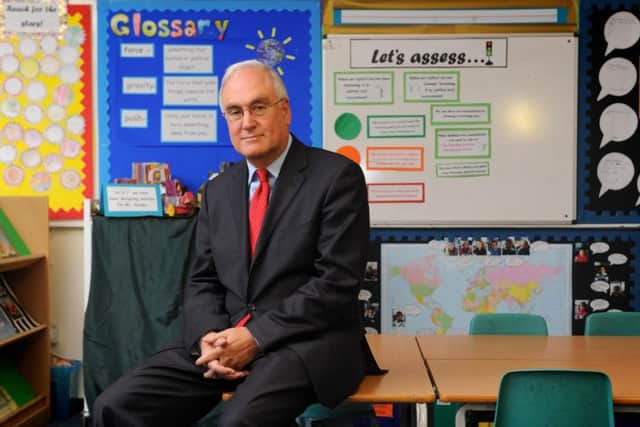Councils blamed for poor schooling in Yorkshire - Leeds and Sheffield get new warning


Sir Michael Wilshaw will say today that the high concentration of underperforming secondary schools in the north and Midlands is “deeply troubling”.
And he will warn Leeds and Sheffield that if they want to be “the engine rooms of a Northern Powerhouse, they need to work with towns on their borders to raise attainment and close skills gaps across a wider area”.
Advertisement
Hide AdAdvertisement
Hide AdOfsted’s latest national report published today will say children in the North are much less likely to attend a good or outstanding secondary school than those in the South, with well over 400,000 children in the North and Midlands going to a secondary rated less than good.


His comments follow letters which were sent to councils across Yorkshire by Ofsted’s regional director Nick Hudson in which he criticised school performance. Town Halls in Leeds and Sheffield were told the performance of primary schools in the two cities was “frankly inexcusable.” However leading councillors hit back at the suggestion that a lack of political will to improve education standards in parts of the North of England was the problem.
Coun Lucinda Yeadon, Leeds City Council’s executive member for children and families said: “The recent Ofsted report into Children’s Services in Leeds judged our operational and political leadership to be outstanding. We recognise that such strong local leadership achieves results, but this is held back in education by an increasingly fragmented school system undermining councils’ desire to intervene to tackle poor performance where appropriate.” She also said that Leeds was already playing a leading role in a Yorkshire-wide school improvement programme.
Coun Jackie Drayton, Sheffield City Council’s cabinet Member for Children, Young People and Families said: “Over the last four years there has been very clear political leadership in Sheffield to work with others to drive school improvement. Up until 2010, school attainment had been static and we had seen no improvement for a number of years. We recognised the need to improve schools in Sheffield, and working in partnership with schools we have already implemented a number of changes to achieve this, resulting in clear improvements in standards over the last five years.”
Advertisement
Hide AdAdvertisement
Hide AdShe highlighted the creation of Learn Sheffield an arms length school improvement company set up in July this year to work with academies and maintained schools.
Sir Michael will also say today that action is needed to address a shortage of high-quality secondary school leaders, especially in the North and Midlands.
The report will identify teacher recruitment as a very real problem across the country.
On the issue of regional underperformance he will argue there is now “an urgent need for the same type of collective action by local politicians, MPs, chief executives and headteachers seen in London in the late 1990s to raise secondary school standards in towns across the North and Midlands.”
Advertisement
Hide AdAdvertisement
Hide AdToday’s report will highlight 16 local authority areas in England where less than 60 per cent of the children attend good or outstanding secondary schools, and make less than average progress and achieve lower than average grades at GCSE. All but three of these are in the north and midlands, and many of them are satellite towns of major cities.
The National Union of Teachers’ general secretary Christine Blower said: “The Chief Inspector refers to the success of the London Challenge which has given London a world class schools’ system.
“However, it has to be recognised that local authorities no longer have the powers to support schools as they did in the 1990s when the London Challenge was in operation. Councils have seen an increasing erosion of their role in education, particularly in the secondary sector, with the promotion of academy status for schools.”
Education Secretary Nicky Morgan said: “The landscape of English education has been transformed over the past five years through raising both standards and expectations.
Advertisement
Hide AdAdvertisement
Hide Ad“Thanks to the hard work of teachers across the country and our ambitious programme of reforms, there are now record numbers of pupils being taught in good or outstanding schools.
“This progress should not be ignored, but like Sir Michael Wilshaw we believe more needs to be done to deliver educational excellence everywhere and tackle pockets of underperformance, so that we can extend opportunity to every single child.”